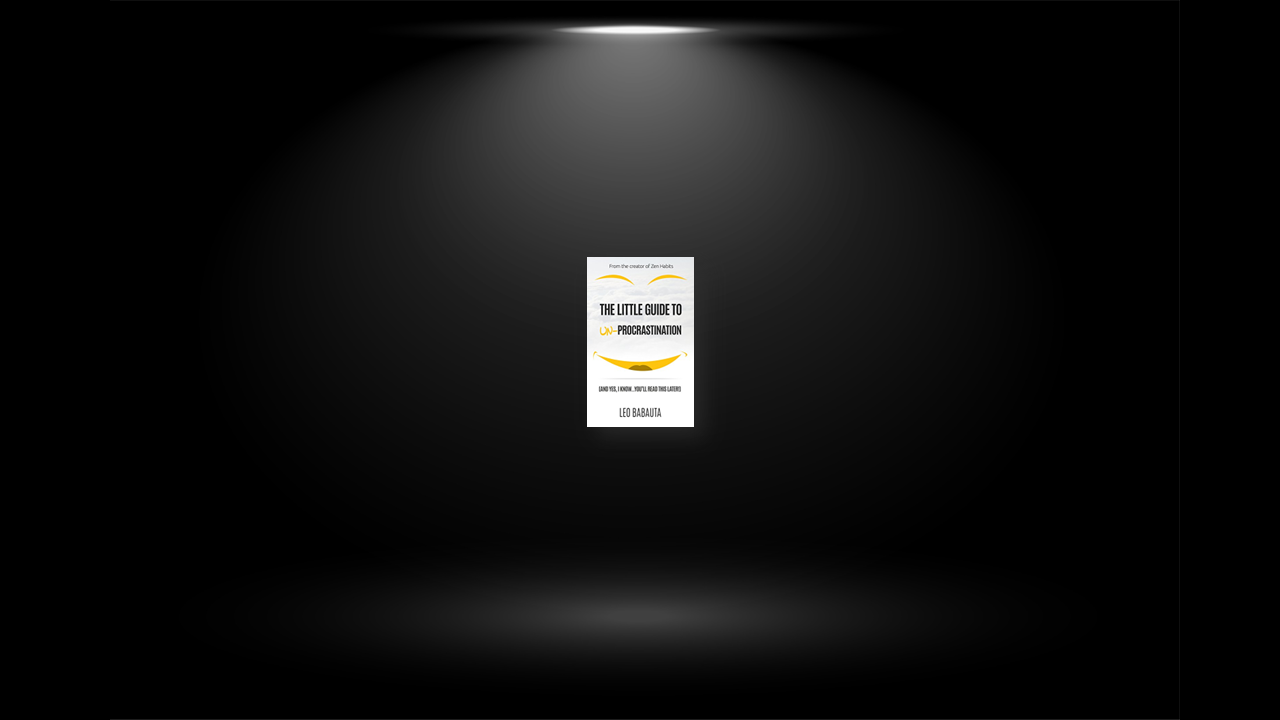When Procrastination is Good
It can be good to procrastinate if you are burned out and need rest, if you go and do something enjoyable with a loved one, if you find solitude and enjoy it, if you go for a walk and sort things out in your head, if you call a friend and have a great conversation, if you have an excellent cup of tea…
The list can go on and on. Procrastination can help us find space, to work at a more leisurely and sane rate, to think and contemplate, to work on our relationships. But procrastination can also hurt us in various ways — especially in keeping us from achieving our dreams. So while I would never try to banish procrastination completely, don’t use this as justification for procrastinating all day long, every day.
Why We Procrastinate
Let’s take a quick look at what makes us procrastinate. There are several usual reasons, which are related in various ways:
We want instant gratification. Resting on the couch is thought of as nicer, right now, than going on a run. Reading blogs is easier, right now, than reading a classic novel, and gives us much quicker enjoyment.
We fear / dread something. We might not write that chapter in our book because there are problems with the writing that we haven’t figured out (often because we haven’t thought it through).
It’s easy — no negative consequences right now. When we were in school and had a teacher looking over our shoulders and scolding us if we didn’t do our work, we tended to do the work (until some of us learned that we could tune out the scolding, that is). But when we got home, sometimes no one would be looking over our shoulders… so there wasn’t any immediate negative consequence to watching TV or playing games instead. Sure, we’d get a bad grade tomorrow, but that’s not right now.
We overestimate our future self. We often have a long list of things we plan to do, because we think we can do a lot in the future. The reality is usually a little worse than we expected, but that doesn’t stop us from thinking the future will be different yet again. For the same reason, we think it’s OK to procrastinate, because we’re going to do it later, for sure. Our future self will be incredibly productive and focused! Except, our future self is also lazy — just as much as our current self is, surprise! — and doesn’t do it either. Damn future self.
We’re not motivated. Procrastination can be our way of telling ourselves that we don’t really want to do something. Perhaps we’re not excited by it, perhaps we’re actually dreading it, perhaps we haven’t fully thought out why we want to do this in the first place. Motivation and procrastination are inversely related — to beat procrastination all we often have to do is motivate ourselves.
A Simple Method
When you are conscious about it, it won’t fail. It’s when we let procrastination happen without thinking that we get beat.
Choose an important task. And be sure you really, really, really want to do it. Find something about it that excites you. Seriously – don’t skip this step. Make it the first thing you do today, before checking email or anything else. Keep things simple — don’t mess with tools, formatting, anything, just start. Clear away everything that stands in the way of doing. Including turning off the Internet.
Just get started. Overcome the initial barrier by diving in. Tell yourself you’re just going to do 10 minutes. Forget about perfection. Just start doing it, and fix it later. Reward your 10 minutes of work with a few minutes of doing something you enjoy — have a cup of tea, stretch & go for a walk, check Facebook or your news sites, whatever you like. Put a timer on this 3-5 minute reward, or it can stretch to an hour!
If you keep procrastinating, re-evaluate whether you really want to do it. Consider not doing it, or putting it on the back-burner. If all else fails, just take a nap or go outside and enjoy the outdoors or do nothing. Life isn’t all about productivity. Do less.
The Art of the Small
Small is better when it comes to getting to completion. It’s easier, which is less friction. It’s less intimidating. But more than that, small tasks and projects are victories. You can quickly get to completion and feel great about it. And that compels you to keep going.
Writing a book, for example, often takes at least six months or even more than a year. Which makes it incredibly difficult, so many writers fail. Lots of large projects work this way — they’re hard to finish, hard to motivate yourself, hard to stay excited about.
Keeping tasks and projects small means they have less friction, and it’s easier to stay motivated. Keep things simple. Narrow your focus. Do less, have less features, offer less services. Small is better, because you’ll get to completion.
Kill Choice
Life is filled with a ridiculous amount of choices, and as a result of this overwhelming array, we put off making these decisions. We float adrift on a sea of choices, unable to pick a path. Kill choice. When we have few choices (or none), we are ironically freed of the burden of choice.
When we have an important article to read in a browser with 10 or 20 tabs open, we put off reading the important article because there are too many other options for this particular moment. But when we close all other tabs but the one article, and have no way to open anything else, we’ll read it.
The amazing French novelist Victor Hugo solved this problem of choice over a century ago. He would strip to the buff, and give all his clothes to his butler, and then write in the nude. He couldn’t go outside and take advantage of the amazing cafes or bars in Paris. He couldn’t receive visitors while buck naked. He could do nothing but write.
Now that’s commitment. You must kill choice to beat it. Your situation will vary, and the solutions for eliminating choice will vary, but here are some examples:
Shut off the Internet or go somewhere where there is no Internet. Close your browser or all the tabs except the one you need to read or work on. Give your router and mobile devices to someone else, and tell them not to give it back to you until you’re done with this task. Hide your TV in the closet if it tempts you. Use a program to block the choices that normally tempt you. Go to a park or a library without anything else to do but the task you need. Use pen and paper and get away from your computer.


